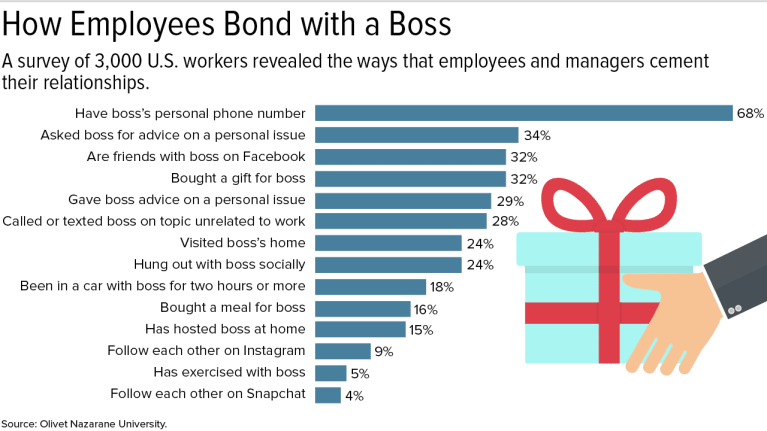Should Managers Be Friendly with Employees?
Significant numbers of workers share personal issues with bosses, meet their spouses

Do your employees socialize with their bosses? Meet their spouses and kids? Talk about personal things? Exercise with them? Buy them gifts?
More than 1 in 3 U.S. workers (38 percent) report that they've asked their boss for advice about a personal issue, according to a survey by Olivet Nazarene University. Nearly 1 in 3 (29 percent) say their boss has asked them for advice about a personal issue. Another 28 percent say they text their bosses about issues not related to work. And nearly 3 in 4 (74 percent) of people who say they are "very happy" at work have met their boss's significant other.
"The most fulfilling relationships I have had with leaders come when they know me and my family on a personal level, and vice versa," said Jessica Schaeffer, senior director for LaSalle Network, a staffing and recruiting firm based in Chicago. "It helps me relate to them [and] empathize, and [we] work better together. People want connection. Connection leads to happiness and satisfaction."
The study authors wanted to understand just how close workers are to their bosses. They asked 3,000 full-time U.S. employees these questions: "What's a normal level of closeness in the modern American workplace? What constitutes that closeness? And how do things vary across industries?"
Personal Phone Numbers, Gift-Giving
The most common connection between bosses and their employees is the exchange of personal phone numbers. Seven out of 10 U.S. workers have their boss's personal phone number, the survey found.
Also relatively high on the list were events like "visited my boss's home" or "hung out with my boss socially." Sixty percent of respondents say their boss had introduced them to the boss's spouse or significant other. More than 50 percent of employees who have kids have introduced them to their boss, and 50 percent of bosses who have kids have introduced them to their employees.
"This display of intimacy and transparency by a boss may correlate with worker happiness," the survey authors wrote. "Seventy-four percent of people who describe themselves as 'very happy' in their current job have met their boss's significant other."
Finally, 1 in 3 say they've bought a gift for their current boss.

"If people are happy at work, they usually are comfortable with their boss on many levels," said Lois A. Krause, SHRM-SCP, and practice leader for HR compliance at KardasLarson, a human resources consulting firm based in Avon, Conn. "They may exchange [information about] family situations with each other. Many organizations have social functions where everyone gets to bring their family or significant other to the function. Many organizations try to make the workplace feel family-like, so by extension, they feel comfortable with their work environment and are happier."
[SHRM members-only toolkit: Developing and Sustaining Employee Engagement]
Occupational Differences
Those working in the legal profession, at nonprofits and in real estate reported the most personal interactions with their boss and their boss's family, the survey found.
While jobs in these fields are very different in practice, there's a certain degree of socialization necessary in all three, said Andy Kerns, who conducted research for the Olivet survey and is a content strategist with Digital Third Coast, a digital marketing firm based in Chicago.
"Attorneys and those working in legal professions tend to work long hours and engage in work-related events that provide opportunities for familiarity with significant others and relatives of one's boss," Kerns said. "Nonprofits tend toward smaller and more-intimate work environments where relationships may easily grow and extend beyond the confines of the office. While real estate is a highly social profession where realtors are entering homes to conduct their work, one could draw the conclusion that a similar familiarity and comfort with closeness would translate into frequent crossovers between work life and family life."
Gender Differences
It's more common for women than for men to have a boss's private phone number (73 percent of women compared to 62 percent of men), to be friends with a manager on Facebook (34 percent compared to 28 percent) and to have bought a gift for a boss (37 percent compared to 24 percent), the survey found. It's more common for men than for women to have been in a car with a boss for more than two hours (21 percent of men compared to 16 percent of women), to have bought a meal for a boss (17 percent compared to 15 percent) and to have exercised with a manager (6 percent compared to 3 percent).
Women tend to approach relationships with managers from something of a distance, said Kerns, noting that having a personal phone number, giving a gift and communicating by social media are "more surface-level interactions between superior and employee."
While fewer men reported engaging in certain activities with their bosses, the activities they do engage in seem to indicate closer relationships, Kerns said. "One could extrapolate that [this indicates] a higher likelihood of men engaging in closer physical contact and activities with their bosses than women."
Was this resource helpful?



